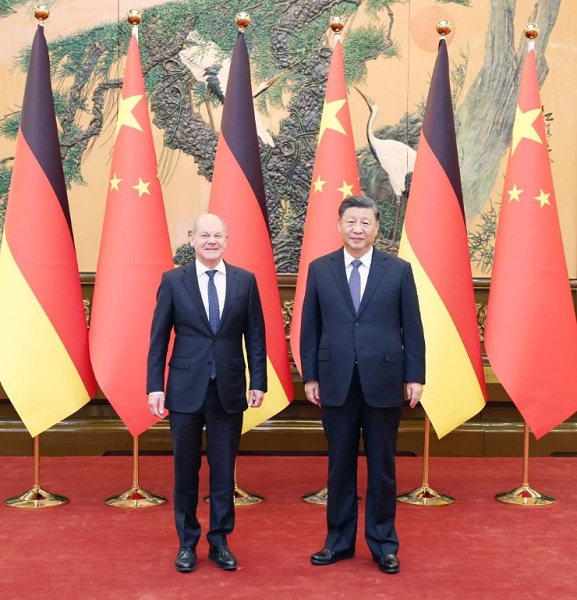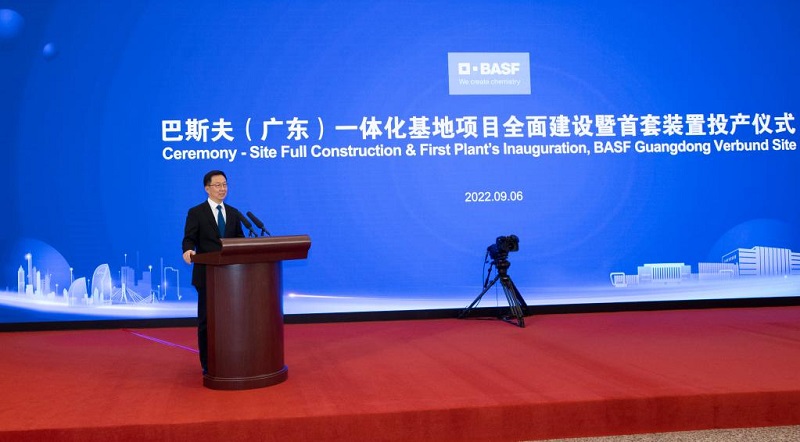German Chancellor Olaf Scholz’s China visit manages to strike a balance between German economic issues and political interests.

Chinese President Xi Jinping meets with German Chancellor Olaf Scholz at the Great Hall of the People in Beijing on Nov. 4, 2022. (Xinhua/Yao Dawei)
German Chancellor Olaf Scholz, who visited China on November 4, was the first G7 and EU leader to do so since the outbreak of the COVID-19 pandemic and after the 20th National Congress of the Communist Party of China. Though the visit was too short to do full justice to the importance of the relationship between the two countries, however, constructive talks held at the highest level will bring benefits to both sides and help to continue the five decades of successful China-German relations. Scholz emphasized the opportunities in German-Chinese cooperation, although, as expected, he also addressed controversial issues due to the strong political pressure on him.
Meeting with President Xi
In his meeting with the chancellor, Chinese President Xi Jinping emphasized that the 50-year history of China-German diplomatic relations shows that steady progress is possible as long as the principles of mutual respect, seeking common ground while reserving differences and pursuing win-win cooperation are maintained. He said China-European relations have an impact on global stability and prosperity in Eurasia. China regards Europe as a comprehensive strategic partner, supports the strategic autonomy of the EU, hopes for a stable and prosperous Europe, and maintains that China-European relations are not directed against, dependent on, or subject to a third party. China will work with Germany and Europe to cooperate in international affairs and jointly resolve global issues.
Scholz said Europe is also facing unprecedented challenges. China plays an important role in addressing global problems and is also an important economic and trading partner for Germany and Europe. Germany rejects decoupling and wants to deepen economic and trade cooperation with China. Germany is also willing to exchange views with China on issues where the two sides' positions do not match, in order to improve understanding and mutual trust. It is opposed to bloc confrontation and is willing to play its role in promoting China-European relations.
When Scholz met Chinese Premier Li Keqiang, there was extensive discussion about cooperation, especially in trade and mutual market access. Scholz also proposed closer cooperation in combating the pandemic and on climate change and biodiversity conservation.
Scholz Rules Out Decoupling
The chancellor's visit took place at a time when the geopolitical situation is becoming increasingly heated. His predecessors Angela Merkel and Gerhard Schröder did not have to deal with such political and media hysteria. Both Scholz's coalition partners and the opposition had been critical in the run-up to his China visit. The Federal Chancellery announced before Scholz' departure that the talks would cover the entire spectrum of bilateral relations and international issues, from joint efforts to combat climate change to the Ukraine crisis and the situation in the East Asia.
In an article published by the German daily newspaper Frankfurter Allgemeine Zeitung, Scholz detailed what his trip to Beijing was about: "It is precisely because ‘business as usual’ is no longer an option in these circumstances that I'm traveling to Beijing." Of the five considerations he mentioned, such as changes in China and changes in the world, the reason directly related to China was that “China remains an important business and trading partner for Germany and Europe — we don’t want to decouple from it.”
The trade figures speak for themselves. Last year marked the sixth year in a row that China was Germany's most important trade partner and the trend has continued so far this year. According to Germany’s Federal Statistical Office, exports to China rose by nearly 3 percent in August compared to July, amounting to € 9.2 billion. Imports from China increased by 2.2 percent to € 15.4 billion.
For the German economy, China has been an anchor of stability, especially in the time of COVID-19. German companies are aware of the strategic importance of the Chinese market and China's increasing role as a technology leader in many areas. It was said that there were 100 applications from German companies to be part of Scholz’s business delegation. The actual delegation comprised 12 captains of industry under the leadership of the Asia-Pacific Committee of German Business (APA). They included heavyweights such as Siemens CEO Roland Busch, also the APA chair, and the CEOs of Deutsche Bank, Volkswagen, BioNTech and BASF, the largest chemical producer in the world.

Chinese Vice Premier Han Zheng addresses the inauguration ceremony of German chemical giant BASF's Verbund site in the city of Zhanjiang, south China's Guangdong Province, and announces the operation of the first plants of the Verbund site, via video link in Beijing, on Sept. 6, 2022. (Xinhua/Xie Huanchi)
BASF is currently building a new plant in Zhanjiang in Guangdong Province with investments totaling € 10 billion. Under its “Project Marco Polo,” Siemens is relocating important factory automation and digitization technologies to China. China is an extremely important market for the German automotive and mechanical engineering industry. Volkswagen sold 3.3 million vehicles in China in 2021. BMW, Mercedes and Volkswagen reportedly have 16 research and development centers in China.
Caveats from EU Policy
To come back to the decoupling issue, Scholz however had several caveats to add to his disclaimer. Germany will put its suppy chains on a broader footing in areas where “risky dependencies have developed,” such as important raw materials from China. Chinese investment in Germany will also be assessed on the same basis. And Germany was going to insist on reciprocity in its engagements with China, from market access for businesses, to licenses, to the protection of intellectual property and equal treatment for German nationals.
However, though Scholz said Germany would follow the EU policy towards China, and the caveats seem to be stemming from that, it will be far from easy to wean Germany companies off the Chinese market. China aims to build a modern market system by 2035 and German companies would want to increase their China footprint and collaborate with the high-tech initiative. Investments from Germany to China have rocketed. According to the Chinese Ministry of Commerce, they rose by 114.3 percent in the first nine months of this year. German entrepreneurs operating in China are doing so on the assumption of long-term stability and positive conditions for their businesses.
This is in stark contrast to the dramatically high energy costs and supply problems in Germany caused by market failures, strict supply chain laws and the EU’s sanctions on Russia. German natural gas company Uniper, for example, has recorded a catastrophic net loss of € 40 billion due to the astronomically high purchase prices. China's rise and economic power is part of the solution, not the problem.
During his China visit, Chancellor Scholz paved the way for the successful relations between the two countries in many areas, including climate change cooperation, in view of Germany and China’s common interests in global stability and security of supplies. Overall, he managed to reach a level-headed compromise between German economic issues and political interests.
___________
Stephan Ossenkopp is a senior researcher at the Schiller Institute in Germany and senior copyeditor at the China Institute of International Studies in Beijing.